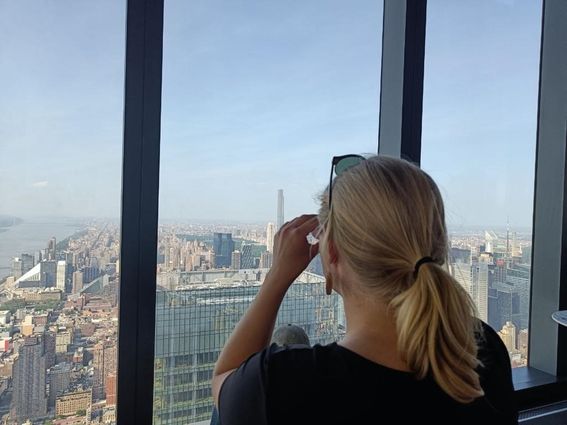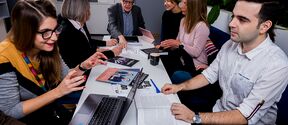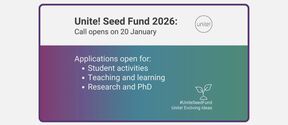Alumna Mira Hänninen: It is inspiring to see that my own work can have a positive impact on society

Who are you? What is your educational background? What did you study at Aalto University School of Business?
I'm Mira Hänninen, an alumna of the School of Business and a lawyer. I am currently working as a Contracts & Claims Specialist at Neste. I studied Business Law at Aalto University at master’s level from 2016-2020. As a minor subject I read Management. I have also studied Law at the University of Helsinki, Spanish Philology at the University of Helsinki, and an advanced Master of Laws degree at Harvard Law School.
I have always had a broad range of interests, which is reflected in my educational background. But I feel that all the different studies have been useful in my career. For example, in my current job, I benefit from both the theoretical studies in law and the practical aspects of corporate law. At Harvard, I gained a more international perspective on law and learned to think more and more about the role of regulation in society and the impact of business on global markets. While studying Spanish, I did a teacher pedagogy course, which taught me presentation skills and the ability to simplify complex issues, taking into account the listener and different ways of learning and understanding.

Why did you choose to study Business Law at the School of Business? How did you decide to apply?
I applied directly to the master’s programme in Business Law because I was already a student at the University of Helsinki Faculty of Law at the time, but I wanted to get even more of a business perspective in law. The studies met my needs: they focused not only on regulation but also on how it affects companies and their decision-making in practice.
In addition, my business law studies allowed me to delve into a field of law that interested me - tax law. Later, my career took me into other areas of law, but it was the practical business perspective that made my studies in business law so useful.
What was it like studying at the School of Business?
Very meaningful! The number of students in master's courses was quite small, which allowed for active discussion and group work. Many of the students already had some experience of working life, and the things we learnt in the discussions were mirrored back to those experiences. The lecturers were inspiring and encouraging. The teaching was also illustrated with case examples from working life.
Student life outside the classroom was lively and there were plenty of student activities to do in your free time. However, this aspect was less relevant for me at Aalto, as I was quite busy with the combination of studies and work, and I had already enjoyed student life at the University of Helsinki. I also managed to complete all my studies in the old main building of the School of Business in Töölö; I think that today, student life can still be quite differently intense if you live and study in the Otaniemi bubble. I do encourage active student life and interdisciplinarity, which is a great opportunity at Aalto.
Mira Hänninen, School of Business alumnaI learned about law in the context of business life, especially from the point of view of its impact on the company and the profitability of different business areas.

What did you personally find most rewarding about your studies? And what was challenging?
The most rewarding thing about the studies was that we didn't just study the content of regulation, but also considered what kind of practical impact it has on companies' business and decision-making. On the other hand, this was also challenging because, especially as a student, you can still have a limited understanding of how business is done in practice.
Could you tell us about your career and what your path has been like?
After graduating with a Master of Laws, I went to work in a law firm where I did a wide range of business law in different areas of law. Most of our clients were foreign companies doing business in Finland. Initially, I focused on tax and corporate law, but later I did a lot of dispute resolution between companies in courts and arbitration. I assisted companies in a wide range of disputes, from contract, IPR to public procurement. I also drafted contracts and provided regulatory advice.
After three years at a law firm, I was able to complete a one-year Master of Laws (LLM) degree at Harvard University in the United States. This is aimed for foreign students who have already graduated as lawyers in their home country. I wanted to do this degree to gain a more international perspective and deepen my knowledge of business law. During the year, I became particularly interested in the development of corporate sustainability regulation and alternative dispute resolution methods such as mediation and negotiation.
After completing my degree, I stayed for an internship at Neste in Houston for the summer of 2022, as I wanted to gain work experience in the US and working for a company to learn more about the commercial side and see how my legal advice supports the business of a company in practice. I returned to Finland in autumn 2022 and ended up working for Neste again.
I am also currently working on a PhD thesis on corporate responsibility at the University of Helsinki.
How has studying business law benefited you in your career and work?
It has been very useful: I learned about law in the context of business life, especially from the point of view of its impact on the company and the profitability of different business areas. This has also realized in my working life: it is of course important to understand the regulation and the theory behind it, but above all to understand how regulation guides the business, both legally and commercially.
At the beginning of my career, my business law studies were particularly useful because I had just deepened my knowledge of tax law and I could apply the theory directly to practical work assignments. Thanks to my studies, I have a strong business perspective and can identify how my own legal advice supports a company's business. I believe that my employers have also appreciated my business law studies.

You work as a Contracts and Claims Specialist at Neste. How did you get to your current role and what does your job entail?
My experience at Neste in the US was great, so I decided to apply for a job at Neste again when I returned to Finland, and I got the job as a Contracts & Claims Specialist. In my job, I support our procurement team of over 100 people in contracting and claims management in case of conflicts with the supplier during contract execution. I plan how we can make contracts in a legally and commercially sensible way, train the team and develop our operations. Current areas for development include increasing the sustainability aspects in our procurement and harmonising and coordinating our policies internationally within the Group.
What skills are needed in your field?
You need to understand the legal and regulatory issues relevant to your work, be able to apply them in practice and keep track of their development. However, it is not enough just to have a good grasp of the regulations: taking initiative, communication and writing skills and the ability to work in a cooperative environment are also important. Working life is increasingly project-based and collaborative. Things are achieved together, not alone. The fast-paced nature of work also makes it useful to be able to outline issues and cause and effect relationships quickly.
In my field, interpersonal skills are also important in the sense that I have to be able to give succinct explanations for my legal advice and convince the other person why they should follow the advice I have given to them. It is equally important to be able to listen to others and ask the right questions so that the advice given is appropriate to the situation at hand.

What is the best thing about your job? And what gives you meaning in your career?
The best part is the variety: I get to help with individual issues, but also to develop our processes in a more long-term way and to think about how contracts and claims should be handled in the future. My job involves a lot of working with others, but also a lot of development work on my own. I also like to combine legal and commercial thinking.
I define meaningfulness and motivation in my career on three different levels. On a personal level, I am motivated by the fact that I am constantly learning new things, developing, and challenging myself and thinking innovatively. On a slightly broader level, I find meaning in helping others in their work and seeing how my own work supports the business.
On a broader level, it's really inspiring that my work can have at least some positive impact on our society. One of today's biggest challenges is climate change and I feel that we cannot afford to lose this fight or else many other important issues will not matter. I am motivated by the fact that I work for a company that works against climate change and in a sustainable way for a better future, such as Neste, and I support the company in this mission through my own work.
What do you like to do in your spare time?
I'm doing a PhD while working, so it could be considered a kind of hobby. In general, I like to do things in my free time that are different from my work. For example, I like to exercise, read fiction, knit, visit museums, do puzzles, spend time in nature and travel at home and abroad.
Find out more about Mira's career and studies on LinkedIn!
School of Business alumni stories
Here you can find School of Business alumni stories. Our alumni share their professional journeys and give advice and tips regarding working life. The stories have been sorted based on the alumni's majors.

Career Services for School of Business students
Aalto University School of Business Career Services offer a wide range of services to our students.

Department of Accounting & Business Law
The Department of Accounting is one of the leading research faculties in the Nordic region.

Read more news

Two Unite! Seed Fund projects involving Aalto secure top EU funding
Two prestigious EU grants have been awarded to projects that were initially supported with Unite! Seed Funding. Both projects involve Aalto.
Major funding powers development of next-generation machine technology aimed at productivity leap in export sectors
The BEST research project is developing new types of sealing, bearing, and damping technology.
The TAIMI project builds an equal working life – a six-year consortium project seeks solutions to recruitment and skill challenges
Artificial intelligence (AI) is changing skill requirements, the population is aging, and the labor shortage is deepening. Meanwhile, the potential of international experts often remains unused in Finland. These challenges in working life are addressed by the six-year TAIMI project funded by the Strategic Research Council, and implemented by a broad consortium.






